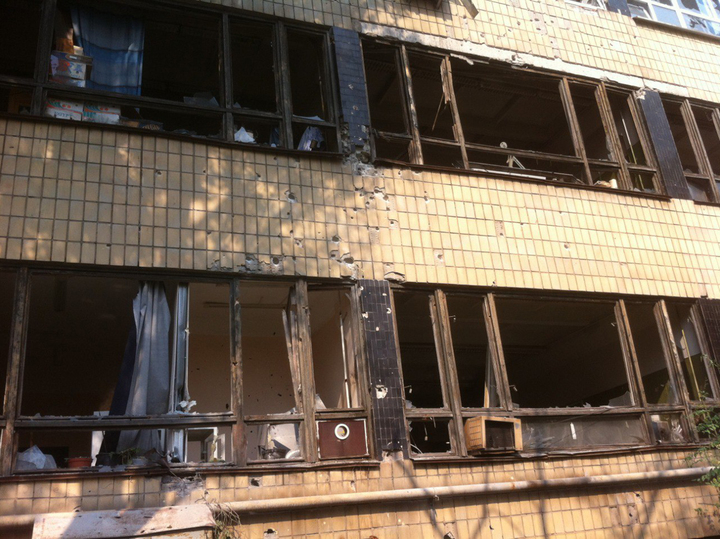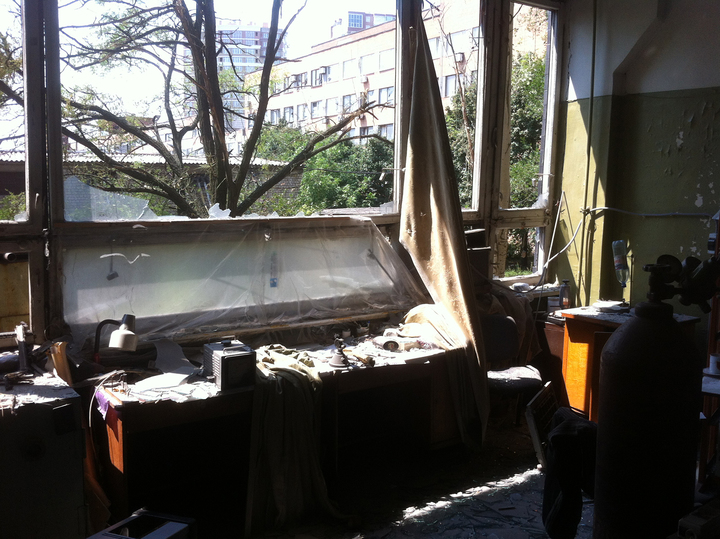“It will fly somewhere”
It is difficult to imagine that research laboratories are still working in Donetsk under the shelling of the Ukrainian Armed Forces. Donetsk Institute of Physics and Technology named after. A.A. Galkina is one of the strongest in the Donbass, and has been subjected to devastating shelling more than once. But the employees who remain here continue to do science no matter what. Deputy Chairman of the DonPTI trade union Evgeniy Shemchenko told MK about how his institute is alive now and how scientists survive.
 Donetsk scientists are forced to additionally insulate the premises of the institute. Photo: DonFTI
Donetsk scientists are forced to additionally insulate the premises of the institute. Photo: DonFTI
Most of the institutions in Donbass have been concentrated in Donetsk since Soviet times. Donetsk Institute of Physics and Technology named after. A.A. Galkina, Institute of Applied Mathematics and Mechanics, Institute of Physical-Organic Chemistry and Coal Chemistry named after. L.M. Litvinenko and many others, before the start of hostilities in 2014, actively supported the metallurgy, mechanical engineering, and chemical industries of the region with their scientific research.
After the shelling of peaceful neighborhoods began, some of the institutes’ employees left. The rest continue to work. Let me remind you that immediately after the entry of the DPR, LPR, Kherson and Zaporozhye regions into Russia, all scientific organizations were assigned to local ministries of science, but everyone was really looking forward to moving under the wing of the Ministry of Education and Science of the Russian Federation. This happened in 2023.
DonFTI im. A.A. Galkin is the largest scientific center for fundamental and applied research in the physics of condensed matter, physics and technology of advanced materials with specified properties. Today, 230 people work here, including 120 researchers, 18 doctors and 48 candidates of science. Phystech managed to maintain a multifunctional line for the production of ceramic nanopowders, a unique X-ray camera for studying substances in extreme states, vacuum equipment and much more.
– We are with Russia, this is for us very important. Although, in fact, we never left it — our employees always went to the Russian Federation for conferences and had joint scientific projects with Russians. It’s just that now we have officially become one small component of big Russian science.
All our employees receive their salaries regularly, everything is in order. The question about equipment, the new instrument base, is very pressing. Science is a very expensive thing, and we understand that it is very difficult to allocate money for everything at once.
– Yes, in 1965, along with a whole complex of scientific institutions. We lived very well, in addition to high science, we also earned money ourselves — our Design Bureau produced scientific instruments, which we sent in small batches to other institutes for testing, and then further to production. All this allowed us, even after the collapse of the Union, to earn money ourselves through projects that were concluded with enterprises in the region. And not only the region — we had scientific projects with Europe, the USA, all of Ukraine, Russia… The money earned greatly helped both to support the instrument base and, simply, to increase the salaries of employees.
 Until now, DonFTI has not been able to replace all the broken glass. Photo: DonFTI
Until now, DonFTI has not been able to replace all the broken glass. Photo: DonFTI
Gradually the situation became more complicated. Ukraine didn’t particularly favor us even until 2014, when a course towards deindustrialization was already set. We were given much less money for equipment than necessary. Ex-President Kuchma once let slip in one of his interviews that American advisers recommended that he remove all “non-core” assets from the research institute, and they issued a corresponding decree. As a result, we lost our design bureau and pilot production. This greatly reduced our ability to interact with enterprises in the region. And then they started closing them too. And if enterprises stopped, science was no longer needed. The authorities purposefully did everything to ensure that Donbass was left without it. A simple example can be given: the same amount of money was allocated for the Lviv institute with 120 employees as for our institute with a staff of 450 people. But there is also housing and communal services, which also require money — to maintain premises, pay for water and heat!
– Among all the institutes, ours, located in the center, on Rosa Luxemburg Street, suffered very badly. We have several large buildings, so it flies somewhere. As it all began in 2014, so, alas, it continues. As a result of the shell explosions, all our windows were blown out, and the roof of one of the buildings was broken through. Another shell hit an electrical substation, and we restored it with our own hands.
— The problem, unfortunately, still remains. The windows in 10 laboratories do not yet have glass. We covered them with plywood and metal sheets, mothballed some of the premises, and moved the equipment to other laboratories.
– We have heating, but it leaves much to be desired. We managed to replace some of the system pipes that were damaged by shelling ourselves from the institute’s reserves, and some were helped by the city.
We have a more serious problem with water — for the second year in a row we are without it. If they are fed into the system, then only in the afternoon. Previously it was once every three days, or even less often. Because of this, some of our scientific equipment that requires water cooling was turned off. We partially resolved this issue — we made looped water supply lines where possible. But this does not solve all problems with water shortages.
The most difficult years were 2014-15. After the majority of our population voted in a referendum for the transition to Russia, we were constantly under fire, and there was terrible uncertainty — we did not know what would happen to us, whether anyone would pay us a salary at all, or whether the institute would simply be closed. Many people left, some to Russia, some to Kyiv, some to Europe… It was difficult.
 The consequences of a projectile arriving at one of the laboratories in 2014. Photo: DonFTI
The consequences of a projectile arriving at one of the laboratories in 2014. Photo: DonFTI
– 20 people, some did not even have time to receive a scientific degree. Two people, to our great grief, died…
Of course there is a connection. For many scientists who did not even serve in the army because they were entering graduate school, it was very difficult at first. Although such inexperienced people, as a rule, are not sent to the first line. But among our employees there are also those who were previously in the army, and now they have joined the assault squads. We reserve all places at the institute for our children without fail, we are waiting for their return.
Now our employees come to work every day. Previously, we had a remote work regime — the authorities officially allowed this, because in reality, on the way to work or home, you could die under fire. And transport was frankly bad for the same reason.
As for shelling, now it feels like there are fewer of them in the city center. Although a couple of months ago, a shell right not far from us, near the former shopping center “Ukraine”, hit a minibus filled with passengers. 16 people died, including children.
– Life goes on, no matter what, and therefore we must work and educate young people. There is scientific equipment that must be constantly maintained in working order.
– Next year we were promised to at least partially resolve this issue, so we have cautious optimism. Yes, investments in science are always large, and the return often has to wait for decades, but it will always be high. The example of the USA, China, Japan, and other countries is before everyone’s eyes. Having received the equipment, we will be able to attract young people with new projects, such as the development of new ceramic materials with unique properties, research in the field of quantum computers, magnetic, strength and other properties of various materials. And we’ll just have to continue working on old projects, of which there are also quite a lot left. The main thing is that our mood is now optimistic, because there is hope, there is a feeling of returning home. We held out through the most difficult times and are now determined to regain our former strong position.


